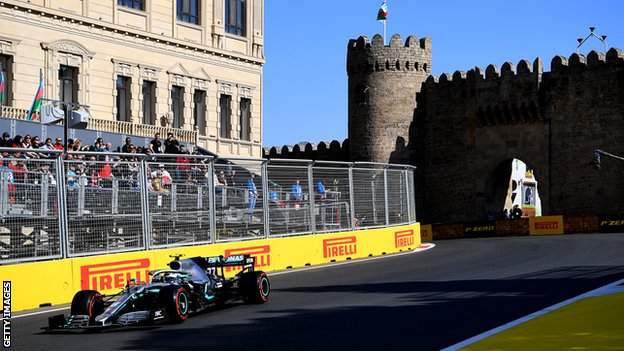The Japanese, Singapore and Azerbaijan Grands Prix have been cancelled because of the coronavirus pandemic.
Formula 1 has tried to find a way to hold the races in 2020 but announced on Friday that was not possible in the uncertain global situation.
Races in Singapore and Baku cannot be held because the street circuits cannot be built in the current climate.
The cancellations mean F1 has lost a further three key grands prix to the Covid-19 crisis that has already claimed the season-opening race in Australia and the blue-riband Monaco event.
Japan and Singapore are two of the most prestigious and popular races on the calendar.
Suzuka resonates with drivers and fans alike as perhaps the most challenging of all tracks, while Singapore’s night event is not only a physical and mental test of endurance because of the hot, humid and bumpy conditions and length of the race, but is also popular with corporate visitors.
Azerbaijan pays one of the highest fees of all races and the Baku street track, with its super-long pit straight, has become known for its incident-packed grands prix.
What’s going to replace them?

F1 is now looking at an increasingly Euro-centric calendar this year, but the sport is still confident of fulfilling its aim of holding a World Championship with 15-18 grands prix despite the postponement or cancellation of the first 10 events of the original 22-race schedule.
F1 said in a statement it has “made significant progress with existing and new promoters on the revised calendar and been particularly encouraged by the interest that has been shown by new venues”.
Eight races in Europe, running from early July to early September and starting with two events on consecutive weekends in Austria on 3-5 and 10-12 July, have been announced.
And BBC Sport understands it is now almost certain that two grands prix at Germany’s Hockenheim track will be added later in September.
Italy’s Mugello circuit, which is owned by Ferrari, is prepared to host a race if necessary.
In addition, F1 is still exploring the possibility of reviving the postponed Canadian Grand Prix in Montreal on a September date before the onset of the Quebec winter.
However they play out, F1 is likely to move on to Sochi for the Russian Grand Prix in early October after these events.
But there is considerable uncertainty over the races in the United States, Mexico and Brazil – three countries where the coronavirus outbreaks are among the worst in the world.
Last week, F1 managing director Ross Brawn told BBC Sport: “If we judge the health and safety risk is too high, even if we can meet the obligations of the country, then we may not go there.”
There is a major events ban in place in Texas that would prevent the US Grand Prix taking place in Austin on 25 October, although the state is in the midst of a phased reopening plan.
Mexico has said it is planning to host its grand prix as scheduled on 1 November, but whether the virus situation will improve sufficiently in Mexico City for F1 to feel that will be possible is unclear.
And the Brazilian race at Interlagos in Sao Paulo is considered unlikely to happen.
President Jair Bolsonaro has come under heavy criticism for his handling of the coronavirus crisis, the state of Sao Paulo has been reporting record numbers of daily deaths this week, and crime is worsening in the city.
F1 is likely to find it politically and socially untenable to hold the race in such circumstances and fly personnel into an area where crime has regularly affected employees working at the race.
The end of the season is set for the Middle East, where both Bahrain and Abu Dhabi have indicated that they are willing to host two races at each of the tracks if necessary.
Credit: Source link